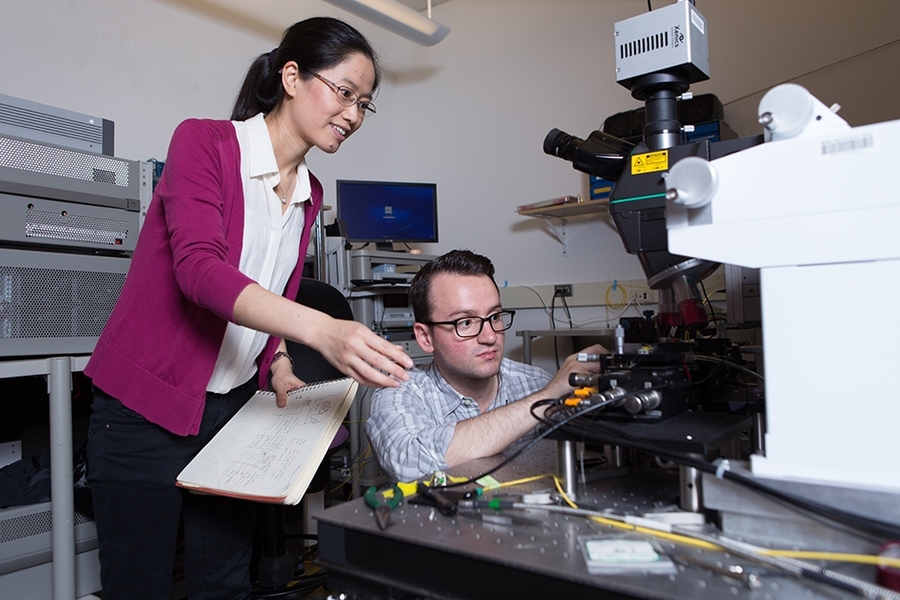MIT boasts a multitude of resources that help bring research discoveries to market, but Yoel Fink, director of the Research Laboratory of Electronics, noticed a gap in the Institute’s entrepreneurial ecosystem. Last year, he launched the Translational Fellows Program (TFP), an experiment to leverage the expertise and talents of MIT postdocs in speeding up the commercialization of MIT research-derived technologies. Using RLE as an incubator for the trial run, Fink invited postdocs to apply for a yearlong program offering them 20 percent support (or one day a week) they could dedicate to identifying and validating the commercial viability of an MIT research-derived technology.
“It was my hypothesis that there is demand we’re not meeting because we don’t have an effective way of getting ideas out,” Fink says. His concept has borne fruit, and is set to expand significantly. The five postdocs selected as the TFP's first fellows moved swiftly to develop technologies in diverse disciplines, with outcomes ranging from filing patents and writing business plans to signing licensing agreements and forming two companies.
It was an experience the young entrepreneurs have found invaluable. “I would not have imagined I could go so far,” says Xiaoting Jia PhD ’11, who has been developing a fiber-based neural interface device. She had no prior entrepreneurial experience, but felt her research was exciting and “might impact the world.”
Corey Fucetola ’04, MEng ’07, PhD ’13, came to TFP with nanomembrane carrier technology he was sure could “fundamentally change how people manufacture integrated circuits for things like phones.” Being a TFP fellow “changed my life,” he says, because “all of a sudden I had the time and bandwidth to think about commercializing my research.”
Now, with the backing of the MIT Innovation Initiative, the Office of the Vice President for Research, and participating departments and labs, the TFP program will have room for 20 participants from labs and departments across the Institute in 2014-15. Only a fraction of the nearly 1,500 MIT postdocs working in MIT laboratories are going to find academic positions, Fink notes, leaving many with few places to take their deep research knowledge and technical skills. What better way to transform this difficult real-world challenge into opportunity, he says, than by giving postdocs the means to convert ideas into commercially viable products. “We can suddenly turn a group of job seekers into job generators.”
TFP responds to another call: the obligation of universities to make the best use of federally funded research. (By law, universities may license research made possible by tax dollars, but with the ultimate goal of giving back to the public.) TFP doesn’t just satisfy the letter of these laws, Fink notes: “It’s introducing a model where thoughts and plans about how to create products and impact from research are happening at the same time we’re doing the research. We’re saying this activity is part of our daily life as academics.” To accomplish this alignment, he says, the program focuses “on the gap between where research ends, and where a company begins — all those questions about market potential, forming a commercializing team, analyzing competing technologies.”
To help novice entrepreneurs bridge this gap, the program features a personalized framework of connections to the Office of Sponsored Programs, the Technology Licensing Office, and MIT’s Venture Mentoring Service. This network will help fellows substantiate the commercial value of their projects and facilitate links to funding opportunities inside and outside the Institute. “You leverage the experiences of people who have done it before,” says Michael Stephen Georgas PhD’13, who is developing an invention involving integrated photonics. “They make you think differently about paths to commercialization.” Adds Jia, “They helped us map out the market, and then decide on the most realistic application of our research.”
The combination of expert guidance, networking, and a paid day per week add up to a transformative year. “The program allowed me to think about my research in a way I hadn’t thought about before,” Georgas says. “Whether you do a startup, go to a company, or stay in academia, taking the time to think about commercialization will change what you do.”






